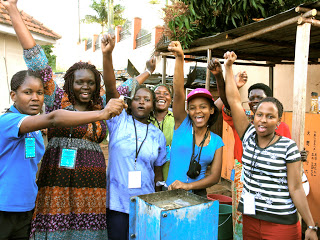UBUNTU
n: an Nguni word from South Africa that addresses the notion of our interconnectedness as human beings. Sentence: “Umuntu ngumuntu ngamuntu:” “I am a person through other people.”
I have been contemplating the implications of ubuntu in my journey to finding my life’s purpose. One February afternoon, I met with Phil Hutchings, founding member of BAJI (Black Alliance for Just Immigration), to learn how his experience with activism could inform my direction as an emerging activist. During the civil rights movement, Phil played a role in organizing youth to protest racist Jim Crow laws, leading to his involvement in the founding of BAJI. His work with in the civil rights movement manifested ubuntu in a profound way – it brought attention to our interconnectedness as humans.
I was born in Ghana, but have lived in the United States since I was eight years old. My efforts to embody ubuntu remind me of the privileges I enjoy in a society where I have all the tools to reach my highest potential. Reflecting on the tension between my privilege, and having family members who don’t enjoy the same privileges, influences what I do. Currently, I am a Research Fellow at Women’s Earth Alliance (WEA), an organization that highlights the role of women in the environmental sector. I spend my time with the Sub-Saharan Africa program that supports ongoing efforts of African women to create holistic and women-led solutions to environmental challenges. The recognition of our interconnectedness and interdependence is reflected in WEA’s core belief that “when women thrive, communities, the environment, and future generations thrive.”

Global Women’s Water Initiative East Africa Women and Water Training Program 2011
If the notion of ubuntu is to be manifested in our everyday lives, then we have a responsibility to act when other human beings cannot enjoy their basic rights and live a life of dignity. Ubuntu presents infinite possibilities for us to bring our highest selves, knowing that “when we do well, it spreads out; it is for the whole of humanity.”
“Umuntu ngumuntu ngamuntu:” “I am a person through other people.”
By Priscilla Ankrah, Research Fellow, Sub-Saharan Africa Program – Women’s Eartha Alliance
